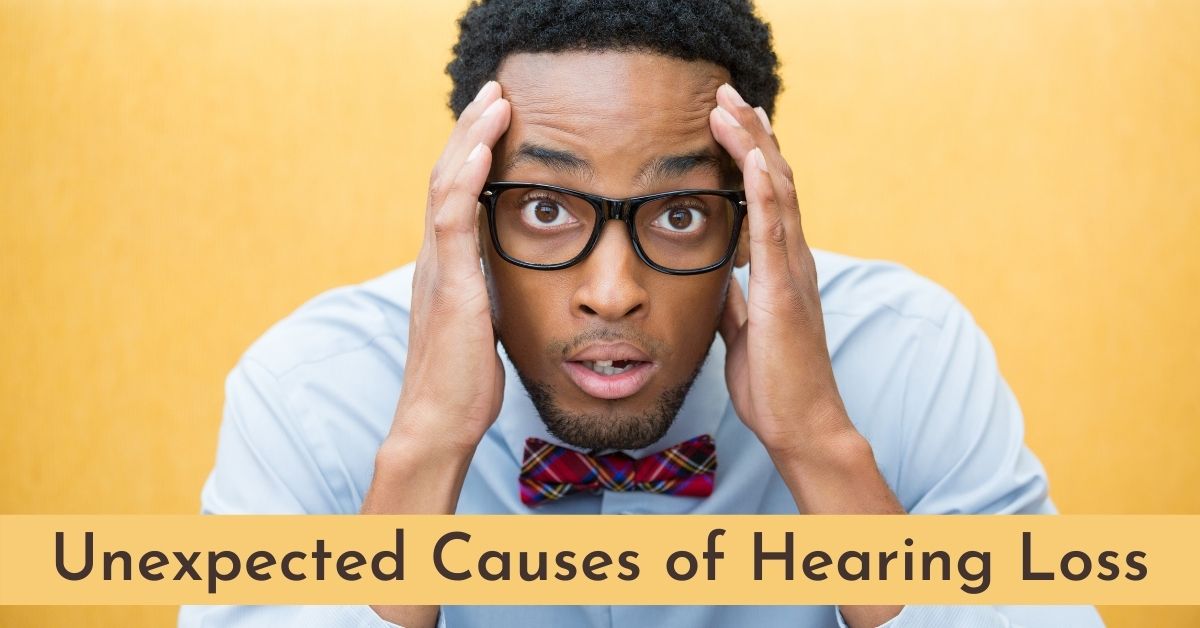
Unexpected Causes of Hearing Loss
Hearing loss affects 48 million people in the United States alone and has serious side effects, reaching far past hearing issues. This is because hearing loss is in part because hearing is a communication issue. When we can’t hear it is more of a challenge to communicate with the people in our lives, which can cause depression, isolation and an overall lower quality of life.
People who let their hearing loss go untreated are less likely to remain social, active and healthy. Healthy hearing can help maintain your ability to connect to the people and activities in your life that you love. Many people know that exposure to noise and old age can impact your hearing but there are many causes of hearing loss that many of us would never expect.
High blood pressure
Many of us would never suspect that high blood pressure, also known as hypertension would be connected to our hearing. However, researchers from the Indian Journal of Otolaryngology and Head and Neck Surgery studied the blood pressure, blood pressure and hearing loss in 284 people between the ages of 45 and 64.
The study found that 34 percent of those with mild high blood pressure had hearing loss in comparison with 18 percent of the participants with normal blood pressure with hearing loss. Healthy hearing relies on an ample and regular supply of blood to support the fragile cells of the inner ear. The researchers suspect that hypertension can damage the tiny blood vessel of the inner ear that helps us hear.
High Cholesterol
Similar to hypertension, having high cholesterol can arteries, raising the risk of heart disease and stroke. These health events can damage hearing quickly. Make sure to monitor and deal with high cholesterol levels before they escalate into a problem that can put your heart, brain and hearing at risk.
Smoking
Health professionals have warned us of the health risks of smoking including cancer, heart disease, stroke, lung diseases, diabetes, and emphysema. Now researchers believe that hearing can also be affected. A 2014 report published in the Journal of the Association for Research in Otolaryngology found that smokers were 15 percent more likely to develop hearing loss than nonsmokers.
Diabetes
The American Diabetes Association has found that those with diabetes are at twice the risk of developing hearing loss than people without the condition. This is because chronic elevated levels of blood sugar are known to damage blood vessels, including those that supply blood to the inner ear.
Ototoxic Medications
Certain medications can damage the tiny hair cells of the inner ear causing permanent hearing damage. These include prescription drugs like certain antibiotics or chemotherapy drugs used to treat cancer. However, some of these are over the counter drugs that many of us take any time we have a slight headache like aspirin and other anti-inflammatory pain medications. Make sure to talk to your doctor and find out the risks of the medications prescribed to you and take over the counter drugs for emergencies only.
Abrupt changes in pressure
“Barotrauma,” is a sudden intense change in pressure and can damage the inner ear temporarily or permanently. For those of us who fly this can happen if a plane changes altitude too quickly. This is also a risk for those who enjoy scuba diving and rise to the surface too quickly. When flying make sure to chew gum in order to normalize the pressure of the inner ear. If scuba diving, make sure to go with an instructor who can help you avoid permanent hearing damage.
Heavy-metal contaminants
While most public drinking water is monitored and filtered by the scandal of lead-tainted drinking water in Flint, Michigan reminded us of the risk of contaminated water. Researchers have found that even a low level of heavy metals like lead, and cadmium can damage hearing over time. Make sure to run your faucet for at least 15 seconds in your house if you suspect any contamination. In addition, a high quality carbon water filter can remove many heavy metals from drinking water.
Deal with your hearing loss
If you suspect that you have an issue with your hearing, don’t delay in having your hearing tested. If a hearing loss is detected, it is recommended to seek treatment before the side effects can progress to dangerous levels. Seek help today for you and your future of your hearing.
